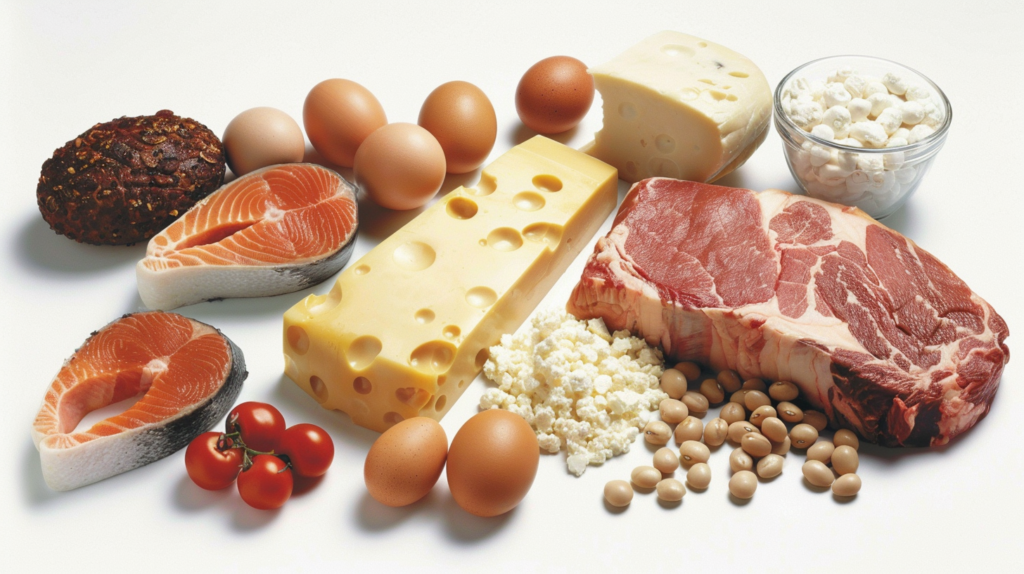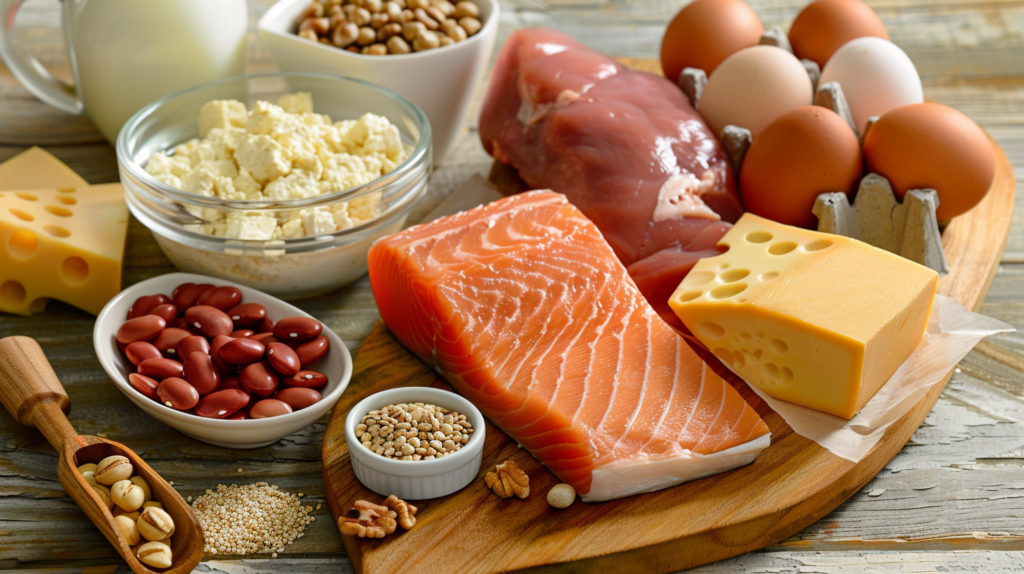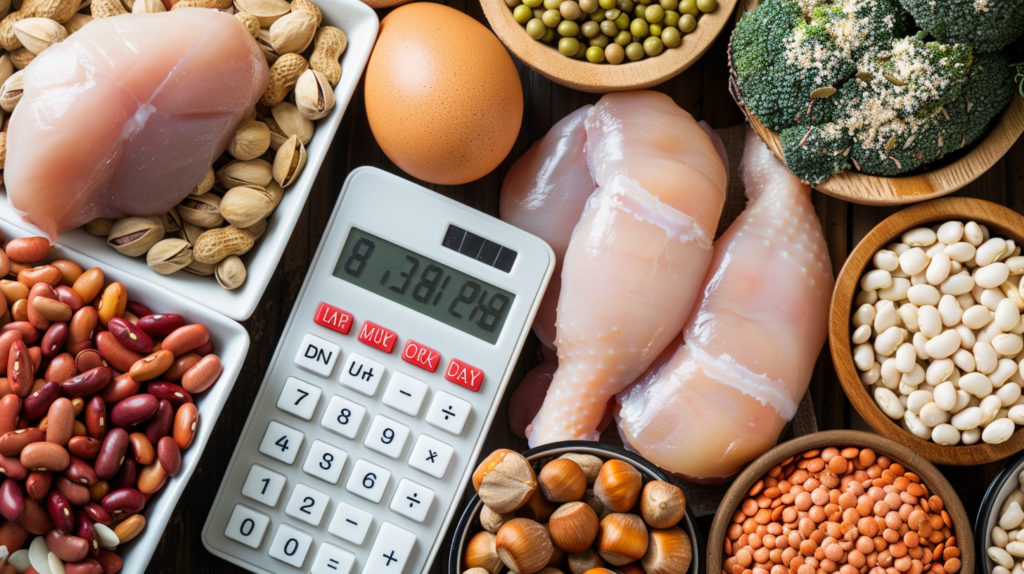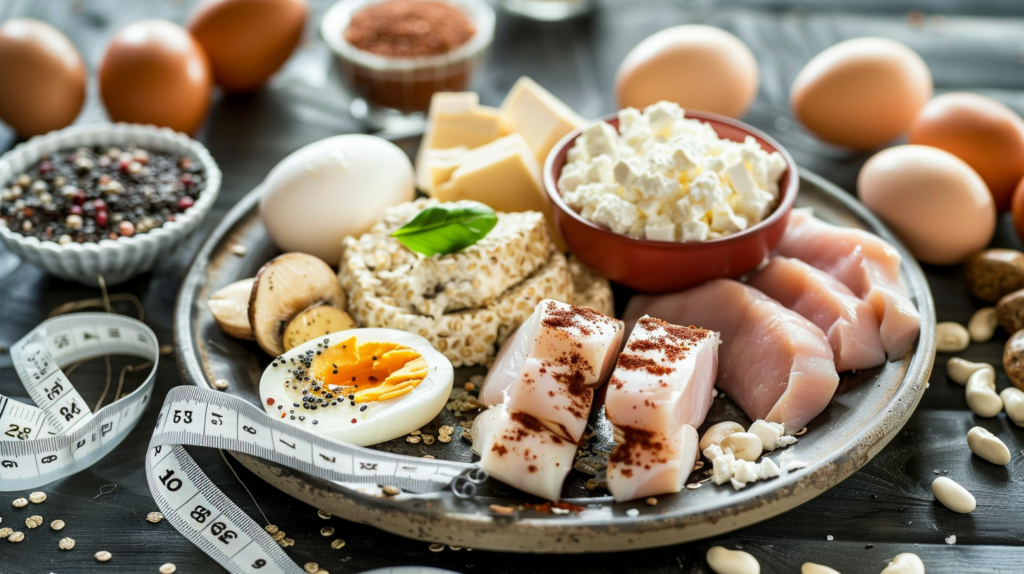Optimal protein intake is vital for bodybuilders aiming for peak performance. Distributing protein evenly throughout the day supports muscle growth. Pre- and post-workout protein intake enhances muscle repair and recovery. High-quality sources like lean meats, eggs, and plant-based options are essential. Calculating protein needs based on activity level and goals is key. Supplements like whey or plant-based powders boost muscle recovery. Experimenting with different sources maximizes benefits. The right timing and type of protein impact muscle synthesis. These strategies can help bodybuilders achieve their muscle-building goals effectively.
Key Takeaways
- Calculate protein needs based on activity level, muscle mass, and fitness goals.
- Distribute protein intake evenly throughout the day for optimal muscle protein synthesis.
- Choose high-quality protein sources like lean meats, dairy, eggs, and plant-based options.
- Incorporate pre- and post-workout protein intake for muscle repair and growth.
- Experiment with different protein supplements to maximize muscle recovery benefits.
Protein Requirements for Muscle Growth

For bodybuilders looking to optimize muscle growth, understanding the protein requirements is essential. Protein intake plays a crucial role in muscle repair and growth.
Research suggests that distributing protein intake evenly throughout the day can be more effective for muscle protein synthesis compared to consuming most of your protein in one meal. This protein timing strategy ensures a constant supply of amino acids for muscle repair and growth.
To maximize muscle repair, it’s recommended to consume protein within two hours after completing a workout. This post-workout protein intake helps kickstart the muscle recovery process, aiding in muscle protein synthesis.
Additionally, having a protein-rich meal before bed can also be beneficial as your body continues to repair and build muscles during sleep.
Incorporating high-quality protein sources like lean meats, dairy, eggs, and plant-based proteins into your meals can help meet your protein requirements for muscle growth effectively. By strategically timing your protein intake and ensuring an adequate amount daily, you can support optimal muscle repair and growth.
Timing of Protein Consumption

Optimizing muscle growth through strategic protein consumption involves considering the timing of protein intake throughout the day. Protein timing plays a crucial role in enhancing muscle protein synthesis and recovery.
To maximize these benefits, it’s recommended to consume protein both before and after workouts. Prior to a workout, consuming a protein-rich meal or snack can provide the necessary amino acids to support muscle protein synthesis during the training session. This pre-workout protein intake can help prime your muscles for growth and repair.
Post-workout, consuming protein within a window of around 30 minutes to two hours after exercise is essential for optimizing muscle recovery and growth. This post-workout protein consumption replenishes amino acid stores, repairs muscle damage, and stimulates muscle protein synthesis.
Types of Protein Sources

When considering protein intake for bodybuilding, it’s essential to understand the various types of protein sources available. Plant-based options like beans, lentils, tofu, and quinoa are excellent choices for bodybuilders. They provide essential amino acids, fiber, and various vitamins and minerals while being lower in saturated fats compared to some animal sources. Plant-based proteins can also contribute to overall health by reducing the risk of chronic diseases such as heart disease and diabetes.
Animal sources like chicken, turkey, fish, eggs, and dairy products are rich in high-quality proteins that contain all essential amino acids needed for muscle growth and repair. These sources are easily digestible and have a high bioavailability, making them ideal for post-workout meals.
While plant-based options offer benefits like fiber and lower saturated fats, they may lack certain amino acids found in animal sources. It’s important for bodybuilders relying on plant-based proteins to ensure they’re consuming a variety of protein sources to meet all their amino acid requirements for optimal muscle growth and recovery.
Calculating Your Protein Needs

Determining the ideal protein intake for bodybuilding necessitates a calculation based on individual factors such as activity level, muscle mass, and fitness goals. To calculate your protein needs, consider consuming around 1.2 to 2.2 grams of protein per kilogram of body weight per day. This range can vary depending on factors like the intensity and frequency of your workouts, whether you’re in a calorie deficit or surplus, and your overall muscle-building objectives.
Meeting your protein requirements offers various benefits, including supporting muscle repair and growth, boosting metabolism, and aiding in satiety, which can be beneficial if you’re striving for fat loss while maintaining muscle mass.
Remember that individual differences play a crucial role in determining your specific protein needs. Factors such as age, gender, metabolism, and training intensity all influence how much protein your body requires to support muscle recovery and growth effectively.
Protein Supplements for Bodybuilders

Protein supplements play a key role in enhancing muscle recovery and growth for bodybuilders. When considering protein supplements, it’s essential to choose the right options to maximize their benefits.
Here are some key points to keep in mind:
- Protein powder options: Opt for high-quality protein powders such as whey, casein, or plant-based options like pea or hemp protein. These powders are convenient, easily digestible, and provide essential amino acids crucial for muscle repair and growth.
- Protein bars selection: Look for protein bars that are low in added sugars and high in protein content. Choose bars with at least 20 grams of protein per serving to support muscle recovery post-workout. Additionally, check the ingredient list to avoid artificial additives and opt for bars with natural ingredients for a healthier choice.
Tips for Optimizing Protein Intake

To optimize protein intake effectively, considering your individual dietary needs and fitness goals is essential. When looking to maximize protein absorption, timing plays a crucial role. Aim to distribute your protein intake evenly throughout the day, including high-quality sources like lean meats, dairy, eggs, and plant-based options.
Consuming protein-rich foods post-workout can aid in muscle repair and growth. Additionally, spreading protein intake across meals can enhance muscle protein synthesis.
Protein timing matters, but so does the type of protein you choose. Fast-digesting proteins like whey can be beneficial post-workout, while slow-digesting options like casein may be ideal before bed to support overnight muscle recovery. Experiment with different protein sources to find what works best for you.
Frequently Asked Questions
Can I Consume Too Much Protein and Harm My Bodybuilding Goals?
Yes, consuming excessive protein can hinder muscle gain and lead to protein toxicity. Overconsumption, especially through protein supplements, can strain your kidneys and cause digestive issues. Optimal intake is crucial for balanced bodybuilding progress.
Should I Adjust My Protein Intake on Rest Days?
On rest days, adjusting protein intake can enhance recovery and muscle repair. We recommend focusing on protein timing to optimize benefits. Supplements can also aid in meeting goals. It’s crucial for overall performance and growth.
What Are the Best Protein Sources for Vegetarians and Vegans?
We’ve found that great plant-based protein options for vegetarians and vegans include legumes, tofu, tempeh, quinoa, and chia seeds. Additionally, protein supplements like pea, rice, or hemp protein powders can be beneficial.
How Does Age Affect Protein Requirements for Bodybuilders?
As we age, protein synthesis decreases, impacting muscle preservation. Older bodybuilders may need higher protein intake to maintain muscle mass. Adjusting protein consumption based on age can support fitness goals and overall health.
Can I Meet My Protein Needs Through Whole Foods Alone?
Yes, we can meet our protein needs through whole foods alone. However, for convenience and efficiency, protein supplements and shakes can be beneficial. They offer a quick and concentrated source of protein that aids muscle growth and recovery.
Conclusion
In conclusion, optimizing protein intake is crucial for bodybuilders looking to maximize muscle growth. By understanding the protein requirements, timing of consumption, types of sources, and calculating individual needs, athletes can tailor their diet to achieve their fitness goals.
Stay tuned for our next article where we delve deeper into the benefits of protein supplements and provide additional tips for enhancing muscle recovery and performance. Keep pushing your limits and fueling your gains!













